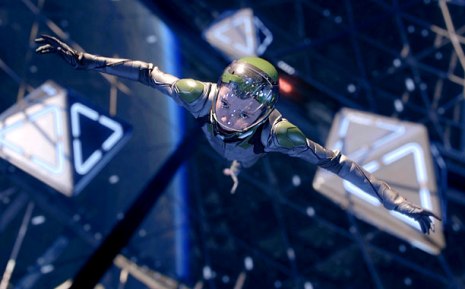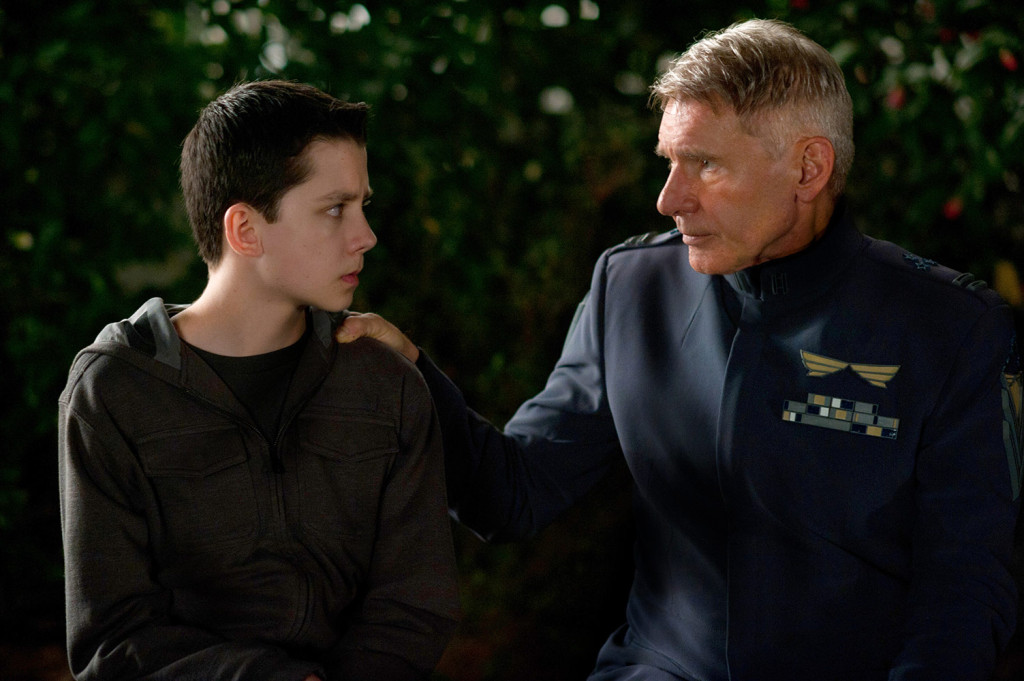
Years ago a bug-like alien race, nicknamed the Formics, tried to invade Earth for the planet’s resources, but thanks to Commander Mazer Rackham’s smart thinking, the humans defeated them. Recent surveillance of the aliens’ planet has shown them regrouping in even greater numbers. In reaction, mankind has been developing more powerful weapons and has instituted military schools to seek out fresh young minds flexible enough outmaneuver and outsmart the Formics once and for all. So begins Ender’s Game, the story of one gifted boy who might just be the one to save mankind.
Ender (played by Asa Butterfield) is smart, possesses a strategic way of thinking, and shows a willingness to utilize brutal violence when necessary. While in military school, he catches the eye of Colonel Hyrum Graff (played by Harrison Ford) who fast tracks him into Battle School, where all the best and brightest get trained to be military leaders.
It’s hard to watch Ender’s Game and not compare it to Harry Potter: A special boy is sent to a special school, where he makes friends and enemies and faces a number of increasingly difficult challenges all in an effort to fight off a great evil force. Yes Ender’s Game the book was around long before Harry Potter the book, but Potter beat him to theaters by a mile, and so it’s hard to watch Ender at Battle School, which is situated just inside of Earth’s orbit, and not think of Hogwarts, which is hidden somewhere Muggles can’t get to. It’s especially hard not to compare Ender’s zero-gravity battles to Potter’s Quidditch.
These battles are the school’s way of preparing kids for space battles. Set in a spherical, zero-gravity room, the goal of the game is to get at least one of your teammates through your enemy’s gate on the opposite side of the room. Everyone has a gun capable of freezing an opponent, more or less “killing” them. The room is full of free-floating pyramids that can be used for gripping or defense. The game is about strategy, and so naturally this is one of the many areas Ender excels.
When I read Ender’s Game, seven or eight years ago, I had a difficult time visualizing exactly what was going on in the zero-grav room. I don’t know if it was Orson Scott Card’s way of describing it or if there was something about the imagery that I just couldn’t picture easily. So naturally I was looking forward to seeing how the movie would render those scenes. Unfortunately, I didn’t find what they did all that interesting. There is little excitement to the battles. Partly it’s because people move rather slowly when they float weighlessly. Quidditch at least had the benefit of those wildly zipping broomsticks. I think I also found it slightly dull because we didn’t really get to see the strategizing taking place in Ender’s head.
Last year Joseph Gordon-Levitt starred in a movie called Premium Rush. He was a bike messenger with a fixed gear bike and no brakes riding through the bustling streets of Manhattan. The lack of brakes meant that when he found himself approaching a red light at an intersection, he had to think quickly. In those instances the movie took us inside his head showing us all the possible actions he could have taken and their possible outcomes: go left and get hit by a truck, go right and crash into a pedestrian, go straight and narrowly avoid getting clipped. I’m not suggesting that the zero-grav battles needed this exact techniques; rather I wanted to see how someone with a tactical mind came up with solutions instead of just seeing the solutions themselves.
The movie goes to many lengths to tell us that Ender has is a great strategist, and we see the great ideas he comes up with, but it all feels heavy-handed. Instead of Ender’s brilliance feeling organic, it seems inserted in there as an easy way of characterizing him. For example, there’s a scene when Ender is first leaving Earth. He and the other “launchees” are in a ship hurtling out of the planet’s atmosphere which generates a low-gravity situation. Colonel Graff comes floating into the room, all stern and colonel like, but Ender looks at him and smiles, amused by something he sees. Right then I found myself thinking, “He’s going to say something now that’ll show everyone how smart and observant he is.” And then he does. It’s a harmless moment, but it’s telegraphed and makes its objective of characterizing Ender way too obvious. If the movie is an shimmering, elegant dress, then in that moment (and some others) its seams were showing.
It doesn’t help that Asa Butterfield comes across a little stiff. I’m not sure he delivers his “strategic” lines smoothly enough for them to seem natural, though maybe that’s a fault of the writing or just the way they created Ender’s character. It’s hard to say.
 What’s easy to say is that the ending is kind of a failure. Ender isn’t a violent person normally, but when he’s stuck in a situation, if violence is the best solution then he will employ it swiftly. No part of him enjoys harming another being no matter how effective he is at it. So it’s already interesting that a person like that was specifically born to be a military leader. (The society he lives in restricts parents to having two kids, and his parents had to specifically request a third hoping he’d excel where his too-violent brother and too-emotional sister failed.) Then near the end of the movie he commits a major act of violence. Given what we know about him, the act should practically destroy him, but the movie hardly spends any time on it. We see an immediate reaction and then how he tries to fix his wrong, but we don’t see him really process things. I can’t remember how the book handled it, but that doesn’t really matter, since the movie must stand on its own, and unfortunately the movie speeds through it so quickly that the massive ending yields hardly any impact. It’s really quite unfortunate. The movie misses its chance to explore something that could have been deep and moving. So it goes.
What’s easy to say is that the ending is kind of a failure. Ender isn’t a violent person normally, but when he’s stuck in a situation, if violence is the best solution then he will employ it swiftly. No part of him enjoys harming another being no matter how effective he is at it. So it’s already interesting that a person like that was specifically born to be a military leader. (The society he lives in restricts parents to having two kids, and his parents had to specifically request a third hoping he’d excel where his too-violent brother and too-emotional sister failed.) Then near the end of the movie he commits a major act of violence. Given what we know about him, the act should practically destroy him, but the movie hardly spends any time on it. We see an immediate reaction and then how he tries to fix his wrong, but we don’t see him really process things. I can’t remember how the book handled it, but that doesn’t really matter, since the movie must stand on its own, and unfortunately the movie speeds through it so quickly that the massive ending yields hardly any impact. It’s really quite unfortunate. The movie misses its chance to explore something that could have been deep and moving. So it goes.
Still, Ender’s Game is fun, it’s pretty, it has a battle scene near the end that is as gorgeous as it is tense, and it has a very interesting premise courtesy of Orson Scott Card’s original material. Sadly, it doesn’t improve on the book (based on my own spotty memory of it). It feels more like a translation that gets across the main plot but loses a lot along the way without introducing anything to replace what is lost. At least the book still exists, and as soon as I finish re-reading Stephen King’s The Dark Tower series, I want re-read some of the Ender books all because of this movie. So there’s that.
My Rating
![]()
Ender’s Game
Director: Gavin Hood (Tsotsi, Rendition, X-Men Origins: Wolverine)
Writer: Gavin Hood (Tsotsi); Orson Scott Card (Ender’s Game [book])




 Posted in
Posted in  Tags:
Tags: 
 The Hobbit: Battle of Five Armies (1/13/15)
The Hobbit: Battle of Five Armies (1/13/15)